#thanks to that I brushed up on divine comedy bc i didnt remember it well and it's an obligatory read for my exams THAT ARE IN A WEEK 😭
Text
Parallels between Bungou Stray Dogs and Divine Comedy
I believe that in the current chapters Asagiri is purposely sneaking in parallels to Dante Alighieri's Divine Comedy. This post will cover the similarities and possible references between bsd's current arc and that book. At first I thought the Meursault prison corresponds to Hell, but now I believe it's actually Purgatory.
Introduction
Similarities
Final thoughts
Divine Comedy (in which the author - Dante - made himself the main character) talks about one's path to breaking free from sin and their growth as a person. It's divided into three parts: Hell, Purgatory and Paradise. During the first two parts, Dante's guide is Virgil (Beatrice comes at the end of Purgatory). In Hell they're going downwards, to the lower circles; in Purgatory they're going upwards, to the higher terraces.
The difference between those two places is that in Hell the souls are suffering endless tortures for their sins, meanwhile in Purgatory they're atoning for them and will eventually leave that place. Depending on what we think is more similar to what's happening in the Meursault prison, we could either interpret it as Hell or Purgatory.
As I said, I believe that it's Purgatory, as the characters are going up, starting from the lowest floor, and that journey helps them (Sigma and Dazai) to grow as a person.
When it comes to Fyodor, I'm not so sure. His goal is to get rid of the abilities, which he compares to a sin. This point acts more as an argument for the Meursault prison, or even his arc overall, to be Hell (not that it's like Hell for him, but more like that's how he thinks of the current events other characters are going through), as his idea of making the ability users free of the the sin is killing them and that's nothing like Purgatory. One could argue tho, that it is similar to the latter, because he wants to release the people from the sin, his idea how to do it and methods are just different.
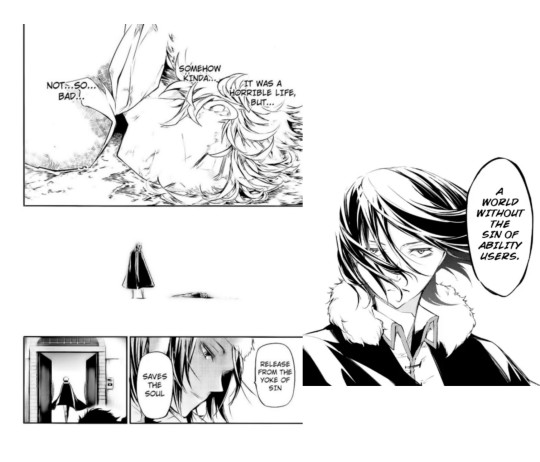
His character and ability are based on Crime and Punishment and that's literally what Dante's Hell is - endless punishment for one's sins. Moreover, Fyodor sees himself as the God's subordinate and Divine Comedy talks about the souls' sufferings because of their wrongdoings to God. It also talks about Dante's path to getting closer to God (metaphorically and literally), and Fyodor thinks of himself as someone between God and the people.
This analysis won't focus on him, but I wanted to point out the (important) religious themes in both of the stories.
What's also interesting is that Dazai and Fyodor (as the most dangerous ability users) had their cells located on the lowest level - similarly to Hell, where the worst people, traitors, were at the lowest ring. Although Dazai is a traitor to the PM, I don't think he parallels those from Dante's work, as they were meant to symbolize that betrayal is bad, but Asagiri shows that what Dazai did was good for him. They correspond to them in their "lack" of humanity and various commited crimes.
Now more of the similarities!
1. Briareus
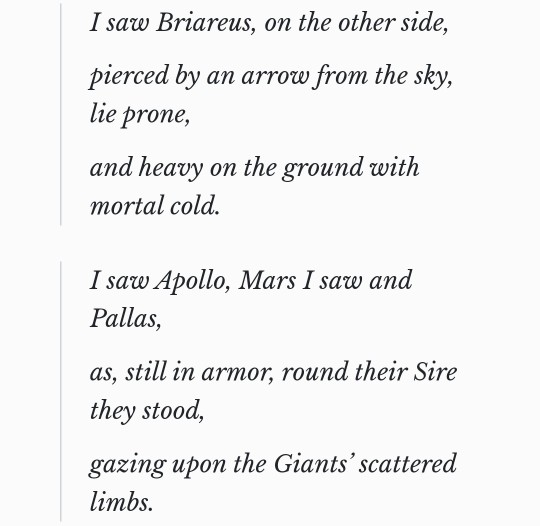
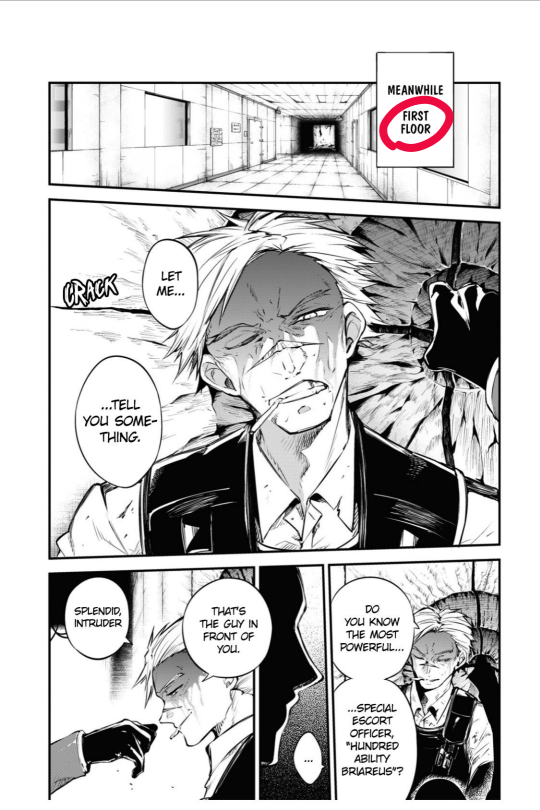
Purgatory, Canto XII; bsd chapter 98
The prison officer's nickname is "Hundred ability Briareus". In Greek mythology Briareus is one of the Hundred-Handers, who helped Zeus and the Olympians to overthrow the Titans.
Quick comparison to bsd: while bsd! Briareus gets killed by a person who's "working" for a prisoner, og Briareus eventually becomes a guard of those he was fighting against.
Briareus is also a character in Divine Comedy. He has two appearances: in Hell he's a giant inhabitating the Ninth Circle; in the first terrace of Purgatory he's one of the giants whose sin was pride. I'll focus on the latter, as it's more similar to the scene from chapter 98.
Dante's Briareus is a sympol of pride and bsd!Briareus says how powerful he is. Moreover, they're both more or less carved into the ground / wall (Dante's Briareus as a form of penance, bsd!Briareus by Chuuya's ability) of the first terrace / floor.
That would mean the Meursault prison is our Purgatory.
(more under the cut)
That scene also reminds me of the beginning of the Fifteen light novel, where Chuuya is really confident in his ability and makes fun of PM for being weak - interesting how he's the one to meet and kill Briareus (in Divine Comedy the meetings help Dante to become free of the sins). Also, the PM member from Fifteen is rather scared of Chuuya and shows him no respect, as opposed to the prison officer.
2. Flames and separation
In Canto XXVII, so almost at the end of Purgatory, Dante has to go through the flames in order to go to Paradise. Virgil can't come with him, as he's not Christian. Instead, he encourages Dante and reminds him of his free will.
In chapter 106.5 Sigma and Dazai also are in a situation involving flames, and even tho none of them actually go through them, they split up - Dazai doesn't leave the lift. Just like Dante and Virgil.
That, and the fact that a big part of Sigma's character is about being used (so not having free will) makes me believe they're paralleling Dante, making Dazai Virgil, their guide through the prison.
Sigma is in the process of finding themselves - similarly to Dante, who with the help of Virgil learns truths about love, good and bad, etc. This heavily reminds me of the conversation from chapter 105.5 about why Dazai chose them and his relationship with ADA.
Here's a comparison of their conversations:
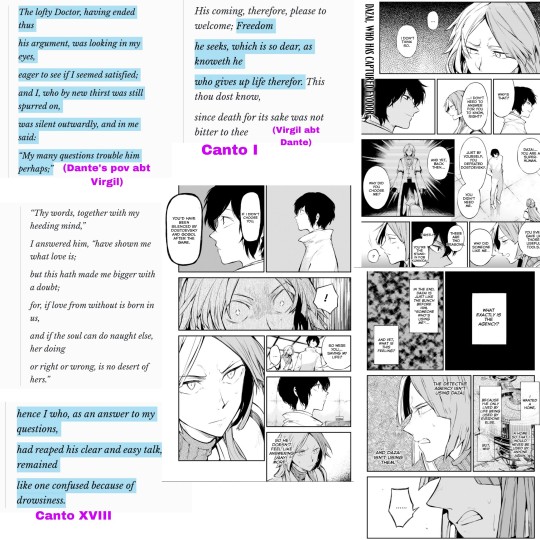

After Dante goes through the flames and leaves Virgil, he sees the march of the Church, and Sigma may find Fyodor in the next chapters. Moreover, Beatrice says the Church is divided and sinful. The people are going into the direction of the tree of knowledge of good and evil (the tree that Eve and Adam got their apple from). Fyodor's view on the world really fits that description, take dead apple and the manifestation of his ability as an example.
3. Water
In Canto XXXI (where Beatrice is the guide) Dante goes through the waters of the river Lethe, which makes him forget his past sins. In XXXIII (the last part of Purgatory) Dante dips in Eone and becomes fully purified.
That obviously reminds me of Fyodor and Chuuya, and then Sigma and Dazai, drowning.
Chuuya - he's currently a vampire (who, because of that, might not remember his past for now - Lethe?). Both the transition to a vampire and being dipped in water have metaphorical meanings involving changing as a person. That situation, along with Dazai's words, could have helped him gain consciousness, at least for a second (you know the whole "his eyes were back to normal" thing), and "cleanse" him from the vampirism. Moreover, in his speech Dazai talked about their relationship, and the one who was by Dante's side when he went through Lethe was Beatrice, his lover. She also talked about love (Canto XXX) and Dazai's farewell was really emotional and more authentic than what he usually says. (Of course I'm not saying they're lovers, just pointing out the similarities)
Sigma - before drowning in Meursault, there was a different panel that showed them being in water. Fyodor talked there about Sigma's loneliness in this world - is Sigma's amnesia similar to Dante going through Lethe? (Or: before coming into Purgatory, Dante had to be washed, because he had to leave his worldly life behind. I think that fact corresponds to Sigma's life even more). Then we got the recent chapters where Dazai saves Sigma. I didn't find many "cleansing" themes in that scene, except for that panel, which reminds me of baptism (it cleanses the person from sins and is done with water):
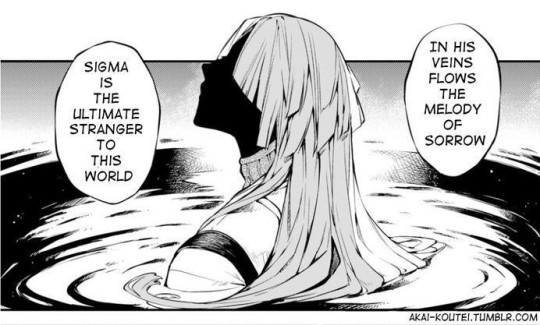
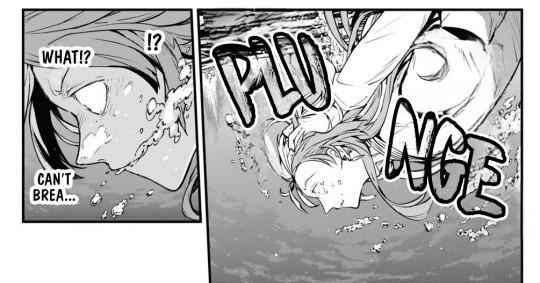
What we can also get from these similarities is that Dazai doesn't necessarily have to correspond to Virgil, but also Beatrice, another guide.
4. Dreams
Throughout his journey, Dante has dreams that help him understand things better in one way or another. In one of them he sees Beatrice, who I already compared to Dazai. Atsushi "hallucinated" as well, in chapter 105. In that vision he sees Dazai who makes / motivates him to move. Atsushi's much like Dante as well - they both are on a journey to become a better version of themselves, but also idealise their mentors.
5. Ango
Just like the spirit, Ango is helping Dazai and Sigma to go through the prison (upwards). Dazai also calls him an 'angel'.
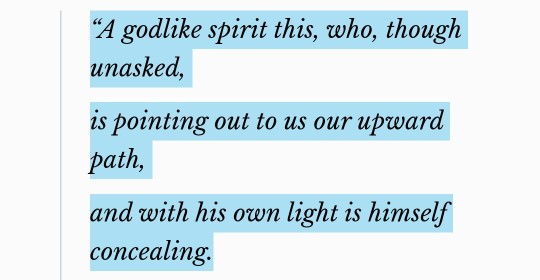
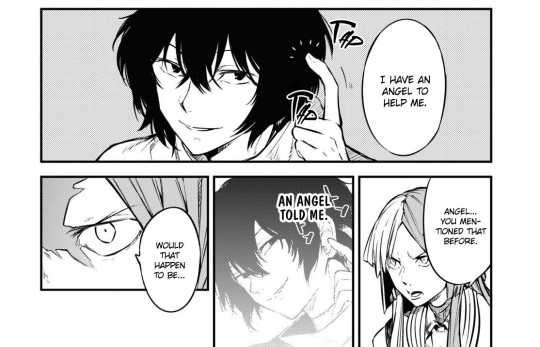
Purgatory, Canto XVII; bsd chapter 101
6. Mykola
The game Fyodor, Dazai and Sigma are playing was made by Mykola. One of the most famous works of the real Mykola Hohol is Dead souls, which some believe that he wanted it to be the Russian Divine Comedy. The book was meant to be a trilogy, but only one volume (that was meant to correspond to Dante's Hell) was created. I even found a reference to it, in which Chichikov (the main character) is compared to Dante:
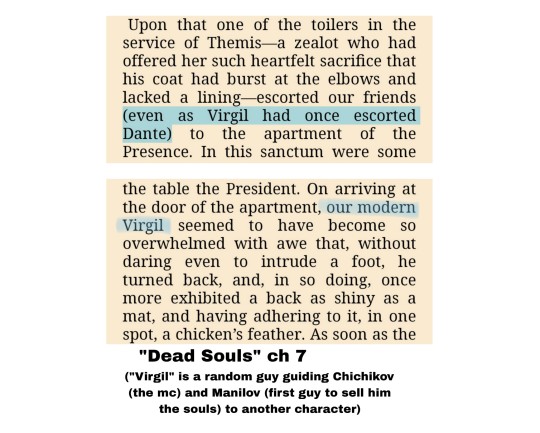
That point acts more as an argument for the game to be Hell, not Purgatory, but the relatedness to Divine Comedy is there. Or maybe it's more that Mykola wants the game to be like Hell, not Purgatory - either for Fyodor or Dazai, it's supposed to end in death. The other one's experience would be like Purgatory, tho, as he'd successfully leave the prison.
Or maybe, it's his journey that he wants to be like Chichikov and Dante's (since he wants to become free). Either way, that person is supposed to go through Purgatory later.
Also, does it mean the game is going to end before it was supposed to? If it hasn't already.
edit: more similarities in the reblogs!!
To sum up, I think one character doesn't have to correspond to just one person from Divine Comedy - and vice versa. Dazai is Virgil, but at the same time Beatrice, another guide, and also has some parts of Dante - he grows and goes through the Purgatory.
We don't have only one Dante - both Sigma and Atsushi share his traits and both go through their own paths to knowing themselves better (with the help of Dazai, too).
Bram and Aya's relationship is the one where, in my opinion, the levels of danteness and virgilness are most equal. Aya is Bram's guide, literally caries him on her back, but also shows him modern technology. Bram also helps Aya and guards her. Not to mention, they're at the highest part of the airport now, which means they have gone upwards.
I argued the Meursault prison is Purgatory, but I also found some similarities to Hell. It can be that it shares both of their traits, maybe depending on a character and what's happening to them.
The question is: is Asagiri writing this arc with so many similarities to Divine Comedy on accident or on purpose? Because if it was just the themes and archetypes that were alike, I wouldn't ask this question, but some of the things I listed are too resembling of Dante's work for me, especially Briareus and what happened in the lift. Not to mention real Hohol's connection to Divine Comedy.
If you have thoughts on this subject, please share! I've spent so much time thinking about this, I don't know anymore if I've gaslighted myself into thinking Asagiri must be doing it on purpose or not (but at the same time!! the similarities!!!). Yes, Dante is way older than every bsd author, but 1) we also have Shakespeare and 2) I believe it's a reference to Divine Comedy as a book, not that he'll be a new character (it'd be so cool tho). But even if it's not Asagiri's conscious doing, the similarities are still very interesting and I enjoyed looking for them.
#FINALLY FINISHED THIS WOO#really please please tell me your thoughts I am begging I need to know if this makes sense#thanks to that I brushed up on divine comedy bc i didnt remember it well and it's an obligatory read for my exams THAT ARE IN A WEEK 😭#also i dont consider myself a Fyodor expert so idk idk. Also if u have opinions varying from mine on this subject TELL please#bsd#bungou stray dogs#bsd dazai#sigma bsd#bsd sigma#bsd mykola#bsd fyodor#bsd chuuya#meursault arc#bsd 106.5#bsd 98#divine comedy#bsd theory#bsd analysis#bsd atsushi#it all started bc i was rereading this arc and saw the name Briareus 🙏🏻#bc why would asagiri include sm details about him?? THAT ARE 1:1 CORRESPONDING TO DIVINE COMEDY???#I hope I don't have many grammar mistakes in the post#dead souls#bsd literature
208 notes
·
View notes